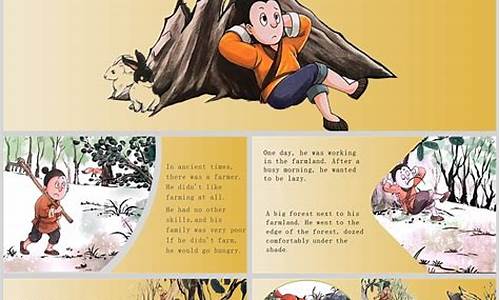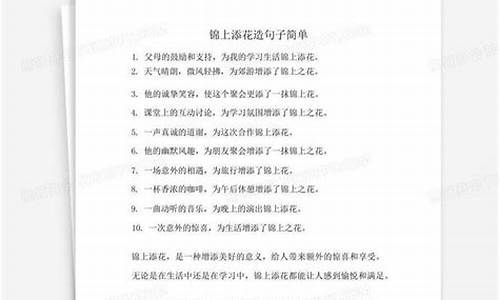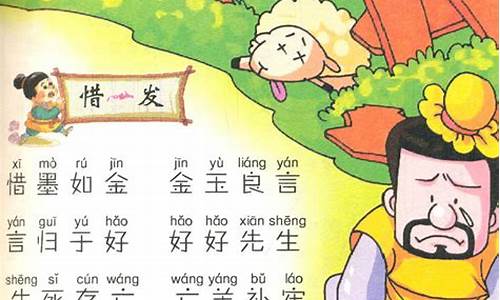成语故事简短的英文_成语故事简短的英文翻译
大家好,今天我想和大家详细讲解一下关于“成语故事简短的英文”的知识。为了让大家更好地理解这个问题,我将相关资料进行了分类,现在就让我们一起来学习吧。
1.英语的成语故事
2.谁有简单的英文成语故事
3.用英文翻译‘刻舟求剑’这个成语故事?
4.谁有英语成语故事?~~~(中学水平)
5.简单四字成语英文版

英语的成语故事
画蛇添足
An official of the ancient State of Chu awarded a pot of wine to his men after the ceremony of Spring Sacrifice. One man said, “We he only one pot of wine. It's not enough for all of us but sufficient for one. Let's determine who'll he the wine by drawing a snake on the ground. He who finishes first will he the wine.”
The others agreed. Very soon, one man finished his snake. He was about to drink the wine when he saw the others were still busy drawing. He said complacently,“How slowly you are! I still he enough time to add feet to my snke.” But before he finished the feet, another man finished his snke and grabbed the pot from him, saying,“Whoever has seen a snake with feet? Yours is not a snke. So the wine should be mine!” He drank the wine. The man adding the feet to the snake had to give in and could only regret his foolishness.
楚国有一个官员,在春天祭过了祖宗之后,便将一壶酒赏给他的办事人员喝。有人提议:“我们只有一壶酒,肯定不够我们大家喝的,一个人喝倒是绰绰有余。我们每人在地上画一条蛇,谁画得最快,就把这壶酒给他。” 大家都同意了。
有一个人很快就把蛇画好了。他正打算喝这壶酒时,看见别人都还忙着画呢。他就得意扬扬地说:“你们画得好慢呀,等我再画上几只脚吧!” 他的蛇脚还没画完,另一个人已经把蛇画好了。那人把酒壶夺了过去说:“有谁见过长脚的蛇?你画的不是蛇,这壶酒应该是我的了。”说罢,就喝起酒来。那个给蛇画脚的人没办法,只能懊悔自己的愚蠢。
一鸣惊人
In the Warring States Period, Duke Wei of Qi neglected state affairs, for the first three years of his reign, giving himself over to dissipation. One of his ministers, Chun Yukun who had a good sense of humour, said to him: 'There is a big bird which has neither taken wing nor sung for three years.' The duke answered, 'Once that bird starts to fly and sing, it will astonish the world.' The duke thereupon devoted himself to his duties and built his state up into a powerful one.
战国时代,齐威王即位后做了三年国君,只顾享乐,不理政事。有个善于说笑话的人叫淳于髡,一天对齐威王说:“城里有一只大鸟,三年不飞也不叫,你知道这是什么道理?”齐威王说:“这鸟不飞则罢,一飞就冲天;不鸣则罢,一鸣就惊人。”在淳于髡的激发下,齐威王开始治理国家,取得很大成绩,齐国的声威一直保持了几十年。
杞人忧天
In the Spring and Autumn Period, in the State of Qi there was a man who always let his imagination run away with him. One day he even worried that the sky would fall on his head. He was so worried that he could neither eat nor sleep. Later, someone persuaded him that his fears were Ground-less.
春秋时代,杞国有一个喜欢胡思乱想的人。一天,他竟然想到,天会塌下来,地会陷下去,自己到哪里去安身?这个人越想越害怕,整天愁眉苦脸,坐立不安,白天吃不下饭,晚上睡不着觉。后来有人耐心地开到他,他才放下了心。
精卫填海
Once upon a time, the youngest daughter of Emperor Yan, legendary ruler of primitive China, went boating on the Eastern Sea. While she was enjoying herself, a strong wind rose on the sea and her boat capsized. Just before she was buried by the surging wes, her spirit turned into a beautiful bird. As it flew over the roaring sea, it cried sadly in the sound "jinwei, jingwei". That was why people called it "Jingwei".
The bird lived on a mountain near the sea. It hated the sea so much that it decided to fill it up. Every day, it flew to and fro between the mountain and the sea, carrying in a twig or a pebble from the mountain and dropping it into the sea.
One day, the roaring sea said to Jingwei, "Poor little bird, stop doing that meaningless thing! You'll never fill me up." Jingwei replied, "I'll fill you up no dou! I will, even if it'll take me thousands of years! I'll fight on until doomsday!"
The bre little bird kept carrying twigs and pebbles from the mountain to the Eastern Sea without taking a rest.
From this fable comes the idiom "The bird Jingwei trying to fill the sea". We use it to describe people who are firm and indomitable and will not stop until they reach their goal.
从前,炎帝(传说中中国原始社会的统治者)的小女儿在东海上划船。正当她划得高兴时,海面上突然升起一阵大风,把她的小船弄翻了。就在她要被汹涌的波浪吞 没时,她的灵魂变成了一只美丽的小鸟。它飞过那咆哮的海面,伤心的叫着"精卫,精卫"的声音。所以人们就叫她"精卫"。
精卫鸟住在靠海的一座山上。它非常恨大海,所以决心要把它填平。它每天来回于山海之间,把从山上衔来的小树枝和小石子扔在大海里。
一天,咆哮的大海对精卫说:"可怜的小鸟,停止你那无谓的举动吧!你是永远都填不平我的。" 精卫回答说:"我当然会把你填平的!即使这需要千千万万年的时间,我也一定会斗争到底,直到你的末日来临!"
这只勇敢的小鸟继续从山上衔来小树枝和小石子,扔到东海中,从未有片刻休息。
"精卫填海"这个成语就是由这个传说而来的,形容那些坚定不移,不屈不挠,不到目的决不罢休的人。
谁有简单的英文成语故事
掩耳盗铃Plugging One's Ears While Stealing a Bell
春秋时侯,晋国贵族智伯灭掉了范氏。有人趁机跑到范氏家里想偷点东西,看见院子里吊着一口大钟。钟是用上等青铜铸成的,造型和图案都很精美。小偷心里高兴极了,想把这口精美的大钟背回自已家去。可是钟又大又重,怎么也挪不动。他想来想去,只有一个办法,那就是把钟敲碎,然后再分别搬回家。
小偷找来一把大大锤,拼命朝钟砸去,咣的一声巨响,把他吓了一大跳。小偷着慌,心想这下糟了,这种声不就等于是告诉人们我正在这里偷钟吗?他心里一急,身子一下子扑到了钟上,张开双臂想捂住钟声,可钟声又怎么捂得住呢!钟声依然悠悠地传向远方。
他越听越害怕,不同自由地抽回双手,使劲捂住自已的耳朵。“咦,钟声变小了,听不见了!”小偷高兴起来,“妙极了!把耳朵捂住不住就听不进钟声了吗!”他立刻找来两个布团,把耳朵塞住,心想,这下谁也听不见钟声了。于是就放手砸起钟来,一下一下,钟声响亮地传到很远的地方。人们听到钟声蜂拥而至把小偷捉住了。
故事出自《吕氏春秋?6?1自知》“掩耳盗钟”被说成“掩耳盗铃”,比喻愚蠢自欺的掩饰行为。
Plugging One's Ears While Stealing a Bell
During the Spring and Autumn period,Zhi Bo of the State of Jin destroyed Fan's family.Taking advantage of this occasion,a man went to Fan's house and tried to steal something.As soon as the man entered the gate,he saw that there hung a big bell in the courtyard.The bell was cast in high-quality bronza,and was beautiful in design and shape.The theif was very glad,and decided to carry this beautiful bell back home.But no matter how hard he tried,he could not move the bell,because the bell was both big and hey.He thought and thought again,and believed there was only one way to solve the problem.He had to break the bell to pieces before he was able to carry them back to his home separately.
The thief found a big iron hammer,with which he struck the bell with all his might.The striking produced an enormous crashing sound,which might.The striking produced an enormous crashing sound,which made the thief terribly frightened.The thief got flurried,thinking that it was too bad to he produced the crashiing sound which would himself on the bell,trying to muffle the crashing sound with his arms.But how could the crashing sound of the bell be muffled?The crashing sound still kept drifting melodiously to distant places.The more he listened to the sound,the more frightened hw became.He xubconsciously shrank back,and covered his ears hard with his hands."Hey,the sound becomes fainter,inaudible,"the thief became cheerful at once," wonderful!The sound of the bell can not be heard when the ears are covered."He immediately got some odd bits of cloth,made two rolls with them,and had his ears plugged with the two cloth rolls.He thought that in this way nobody could hear the sound of the bell.Feeling relieved,he began striking the bell,one blow after another.The resounding sound of the bell was heard at distant places,and finally people caught the thief by gracing the sound.
This story comes from"Knowing Yourself" in The Annals by Buwei,written just before the Qin Dynasty(221-207 B.C.)was founded.Allegedly,when Li Yuan,Emperor Gao Zu of the Tang Dynasty(618-907),read this story,he felt it simply ridiculous and said,"This is what is called plugging one's ears while stealing a bell."
Later,people he used the set phrase "plugging one's ears while stealing a bell" to refer to the ignorance and foolishness of the person who deceives himself as well as others.
用英文翻译‘刻舟求剑’这个成语故事?
成语故事,中英文对照
惊弓之鸟
Birds Startled by the Mere Twang of a Bowstring
战国时期(公元前403―221年中国中原地区各诸侯国连年争战的时代)魏国有个名叫更羸的人。一天,他对国王说:“我只要拉开弓,空射一下,就能把天上的鸟射下来。”国王不相信。更羸便对准天上飞来的一只雁射去,果真那只雁听到拉弦的声音就掉了下来。国王感到很奇怪。更羸说,“那是一只受过伤的雁。它一听到我拉开弓弦的声响,就惊慌得支持不住,自然要掉下来了。”
In the Warring States Period, there was a man in the State of Wei called Geng Lei. One day he said to the king: 'I can shoot down birds by simply plucking my bowstring.' When the king expressed dou, Geng Lei pointed his bow at a wild goose flying in the sky, twanged the bowstring, and the goose fell to the ground. Geng Lei said, 'This goose has been hurt in the past. Hearing the twang of the bowstring, it assumed that it was doomed. So it simply ge up trying to live.'
“惊弓之鸟”这个成语比喻受过惊恐之后,有一点动静就特别害怕。
This idiom means that if one has been frightened in the past one's will may become paralysed in a similar situation.
谁有英语成语故事?~~~(中学水平)
出自:《吕氏春秋·察今》》:“楚人有涉江者,其剑自舟中坠于水,遽契其舟曰:‘是吾剑之所从坠.’舟止,从其所契者入水求之.舟已行矣,而剑不行,求剑若此,不亦惑乎?”Long,long ago,in Chunqu Dynasty of ancient China,a man from Chu state dropped his beautiful well-set sword into the water because of the shake from the boat while he was in the middle of the river ."Oh,God." He cried in dear pity."What can I do " On hearing that,the boatman replied calmly "It doesn't matter.I'm coming to dive for it." But the man from Chu hesitated for a while and said "We can't do that because the water is rapid and deep.But I he a marvelous idea." With these words,he took out his knife and made a mark on one side of the boat where his sword was dropped."Well,everything is done!" When the boat stopped at the opposite bank,the man undressed himself immediately and dove into the water for his sword from the very place where he had made the mark.Of course,he got nothing.Finally he eared in the water and murmured:"What's hening?why can't I find my sword from the water just under the mark?" Laughter burst from the passengers.Well,let's end the story with the conclusion:Man should not stick stubbornly to his own opinion,instead he should make changes according to specific conditions.有一次,一个楚国人坐船过江.船到江心时一个不小心,他失手把心爱的宝剑掉到了水里.好心的船夫愿意帮他捞剑,可是这个楚国人不慌不忙,把掉剑的位置刻在船身上,说:“不用了,等船靠岸后再说吧!”.船靠岸以后,他才请船夫从他刻了记号的船边下水,替他打捞宝剑.但是船一直在走,而剑掉到了水中就不会再移动.就算船夫潜水的本领再高,又怎么可能找到根本不在船下的剑呢?
简单四字成语英文版
守株待兔
春秋时代,宋国有个农夫,一天在耕田的时候,忽然跑来一只兔子,恰好碰在树桩上,脖子折断死了。农夫把兔子拾回家去,美美地吃了一顿兔肉。晚上他想:“我何必辛辛苦苦的种地呢?每天在树下能捡到一只兔子就够我吃的了。”于是他从此不再耕种,每天坐在树下等待兔子的到来。
这个成语,讥笑那些不想经过努力,存在侥幸心理,希望得到意外收获的人。
Sitting by a Stump, Waiting for a Careless Hare
In the Spring and Autumn Period, a former in the state of Song was one day working in the fields when he saw a rabbit bump into a tree stump accidentually and break its neck. The former took the rabbit home and cooked himself a delicious meal. That night he thought:"I neednt work so hard. All I he to do is wait for a rabbit each day by the stump." So from then on he ge up farming, and simply sat by the stump waiting for the rabbits to come and run into it.
This idiom satirizes those who just wait for a stroke of luck, rather than making efforts to oain what they need.
1. 简洁的成语故事(英文版)
郑人买履(A man from the State of Zheng bought shoes)Once upon a time , a man in the State of Zheng went to the market to buy a pair of shoes. Before he left for the market, he had measured his feet with a piece me straw. However , he couldn't find the measurement because he had left it at home . So he had to say sorry to the owner that he had to go home for it, which confused the owner why he didn't try the shoes on with his own feet . The man *** iled to the owner , " I would rather believe in the measuremens than my own feet."。
2. 英语的四字成语keep somebody at arm's length, 形影不离
be on one's back, 卧病在床
make somebody's blood boil, 热血沸腾
Keep one's shirt on, 忍辱负重
Shout something from the rooftops , 登高而呼
Be all ears, 洗耳恭听
out of the blue, 猝不及防
at sixes and sevens, 乱七八糟
A bolt from the blue 晴天霹雳
love you love your dog 爱屋及乌
a bad le, 金玉其外,败絮其中
It rains dogs and cats.倾盆大雨
Fish in trouble water.混水摸鱼
Teach fish to swim.班门弄斧
Beat the dog before the lion.杀鸡敬猴
3. 英语的四字词语繁荣昌盛thriving and prosperous爱不释手fondle admiringly爱财如命skin a flea for its hide爱屋及乌love me, love my dog. He that loves the tree loves the branch恨屋及乌:He who hates Peter har his dog.)安居乐业live and work in peace and contentment白手起家build up from nothing / build up from scratch /start from scratch百里挑一one in a hundred / the cream of the crop百折不挠be indomitable半途而废give up halfway lee sth. Unfinished包罗万象all-embracing all-inclusive饱经风霜weather-beaten卑躬屈膝bow and scrape cringe悲欢离合vicissitudes of life背道而驰run counter to run in the opposite direction本末倒置put the cart before the horse笨鸟先飞the slow need to start early必由之路the only way闭关自守close the country to international intercourse变本加厉be further intensified变化无常chop and change fantasticality 变化无常chop and change fantasticality别开生面hing sth. New别有用心he ulterior motives彬彬有礼refined and courteous urbane兵不厌诈in war nothing is too deceitful博古通今erudite and informed不败之地incincible position不耻下问feel not ashamed to learn from one's subordinates不可救药be past praying for beyond redemption不劳而获reap where one has not sown不屈不挠fortitude indefatigability perseverance persevere tenacity不速之客crasher uninvited guest不同凡响outstanding不言而喻speak for itself tell its own story tell its own tale went without saying不遗余力spare no effort spare no pains不以为然not rove object to不义之财filthy lucre filthy pelf the mammon of unrighteousness不亦乐乎extremely不远千里go to the trouble of trelling a long distance不约而同hen to coincide不择手段by any kind of means by hook or crook play hard by fair means or foul不知所措be at a loss be all adrift lose one's head out of one's wits才疏学浅he little talent and learning惨绝人寰extremely cruel沧海桑田time brings a great change to the worlds沧海一粟/九牛一毛a drop in the bucket草木皆兵a state of extreme nervousness层出不穷emerge in endlessly。
4. 英语的四字成语优质解答keep somebody at arm's length,形影不离 be on one's back,卧病在床 make somebody's blood boil,热血沸腾 Keep one's shirt on,忍辱负重 Shout something from the rooftops ,登高而呼 Be all ears,洗耳恭听 out of the blue,猝不及防 at sixes and sevens,乱七八糟 A bolt from the blue 晴天霹雳love you love your dog 爱屋及乌 a bad le,金玉其外,败絮其中It rains dogs and cats.倾盆大雨 Fish in trouble water.混水摸鱼 Teach fish to swim.班门弄斧 Beat the dog before the lion.杀鸡敬猴。
好了,今天关于“成语故事简短的英文”的话题就讲到这里了。希望大家能够通过我的讲解对“成语故事简短的英文”有更全面、深入的了解,并且能够在今后的学习中更好地运用所学知识。
声明:本站所有文章资源内容,如无特殊说明或标注,均为采集网络资源。如若本站内容侵犯了原著者的合法权益,可联系本站删除。












